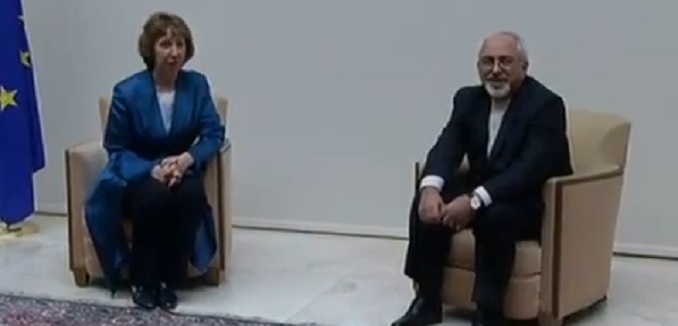Talks which concluded today between Iran and the P5+1 in Geneva are being described with optimism in some quarters and pessimism in others, as analysts and policymakers struggled to figure out what exactly the Iranians offered and if the offer would be sufficient to put nuclear weapons beyond the reach of the Iranian regime. Reuters noted that while talks were “serious and candid,” senior officials who spoke to the outlet are still expressing caution.
But a senior U.S. administration official told reporters after the conclusion of negotiations between Iran and six world powers that no breakthroughs had been achieved and many disagreements remained. Other Western diplomats involved in the talks said there had been no apparent narrowing of differences between Tehran and the six nations over its nuclear ambitions.
The descriptions seem to confirm assessments made a day earlier by Gary Samore, the U.S.’s “WMD Czar” during President Barack Obama’s first term, on a conference call hosted by The Israel Project. Samore told the journalists and diplomats on the call that what Iran was publicly offering was “really no different than what we’ve heard from the previous government… from Ahmadinejad’s government” and that “it may be necessary for the U.S. and its allies to proceed with additional sanctions before he recognizes the need to make any really significant concessions.” U.S. policymakers who spoke to the Washington Post today echoed Samore’s suggestion that further pressure might be called for, with one former official worrying that “what the Iranians appear to have offered allows them to keep their whole program and all their enriched uranium.” The Guardian described the Iranian plan as having multiple stages, with confidence-building deals involving “unspecified limits” on Iranian enrichment during early months, followed by acts in the second stage which would “further consolidate” the trust that had been built, ultimately creating a “new equilibrium” for the third stage that would involve intrusive inspections by the U.N.’s nuclear watchdog.
The most difficult part will be getting from such a deal to Tehran’s third phase. There are some major obstacles. The West does not want the heavy water reactor in Arak turned on, because it would start producing plutonium and then be immune to air strikes, as bombing would send up a radioactive plume. According to one version of the Iran plan at least, Tehran insists Arak goes ahead. Then there is the underground enrichment plant at Fordow. The West wants it closed, but for Tehran a bomb-proof facility is essential insurance against things going sour.
Iranian Deputy Foreign Minister Abbas Araqchi subsequently clarified that limits on enrichment would not actually not be part of the first stage. Members of Congress, top analysts, and the editorial board of the Washington Post have all in recent days noted that such a deal – which would leave Iran with enriched material and the capacity to enrich more – would be unacceptable and would leave the regime with the ability to follow North Korea’s example and dash across the nuclear finish line. Citing American weakness, General Hassan Firouzabadi, Chief of Staff of the Iranian Armed Forces, bluntly advised President Obama to take the deal Iran is offering.
“The Islamic Republic of Iran’s positive and constructive diplomacy has created a great historical opportunity and the US administration shouldn’t miss this constructive opportunity because the chance won’t stand forever,” Firouzabadi said on Wednesday.
The next round of negotiations in Geneva is scheduled for November 7-8.
[Photo: The World News / YouTube]




